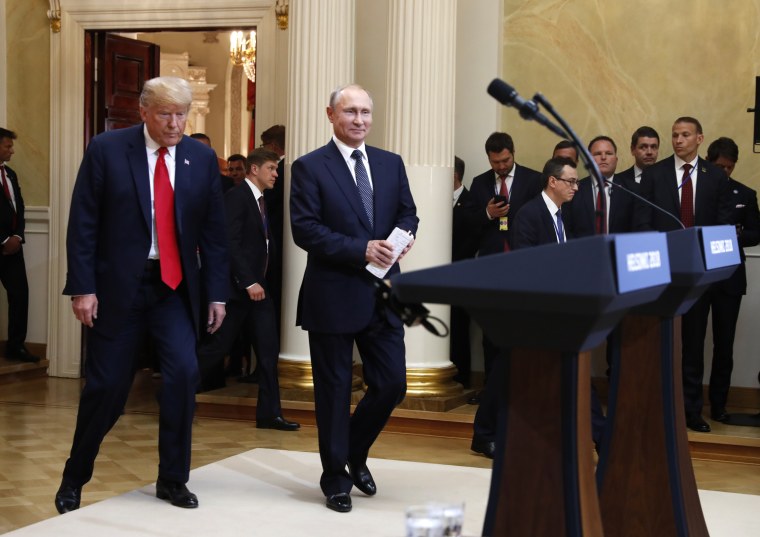It was just a few weeks ago when Donald Trump, having returned from his "summit" with Russian President Vladimir Putin, appeared to tell reporters that our adversary is no longer trying to influence American elections. The presidential assessment was badly at odds with the warnings from the U.S. intelligence community.
Indeed, Trump's rhetoric seemed especially odd today, when five of the top U.S. national security officials -- National Security Adviser John Bolton, Homeland Security Secretary Kirstjen Nielsen, FBI Director Chris Wray, Director of National Intelligence Dan Coats and Gen. Paul Nakasone, the director of the National Security Agency and the commander of U.S. Cyber Command -- each stood in the White House press briefing room and made it categorically clear that Russian efforts to interfere in this year's elections are already underway.
The united front was a welcome sight, though it hardly erased substantive concerns about the seriousness -- or lack thereof -- with which the administration is taking the issue of cyber-security threats. But as part of today's presentation, there was a related comment that stood out.
...Coats admitted he still did not know what was discussed by President Donald Trump and Russian President Vladimir Putin during a controversial private meeting they held in Helsinki, Finland earlier this month."I'm not in a position to either understand fully or talk about what happened in Helsinki," he said.At a joint press conference after the private meeting, Trump suggested that Putin was more credible than his own intelligence officials, including Coats, who has accused Russia of undertaking an "unprecedented influence campaign" in 2016.
We're 17 days removed from the "summit." How is it possible that the nation's top intelligence official still doesn't "understand fully" what the two presidents discussed?
Part of the problem, of course, is that Trump didn't allow any U.S. officials, including Coats, to participate in the talks, for reasons the White House has struggled to explain.
The other part of the problem is that the American president didn't make much of an effort to share the details after his meeting was over. As we recently discussed, in the immediate aftermath of the Trump/Putin meeting, Russian officials began talking publicly about implementing some of the “agreements” the two presidents reached. U.S. officials seemed to be caught off-guard – because Trump hadn’t told them anything about what was said at the meeting.
The Washington Post reported soon after that “officials at the most senior levels across the U.S. military” were still scrambling without information two days after the summit in Helsinki. (A few days after the meeting, Coats publicly acknowledged that he didn’t know what was said in Helsinki. Evidently, he still doesn't.)
Susan Glasser had a striking piece in the New Yorker, explaining that top members of the White House team had “literally zero” information about possible commitments Trump may have agreed to with Putin – because “unlike Putin, Trump did not brief his own diplomats.”
White House allies have suggested it would take a little time before all of the relevant players in the administration were brought up to speed. Seventeen days later, the fact that the director of national intelligence doesn't "understand fully" what transpired suggests it's taking far longer than it should.
